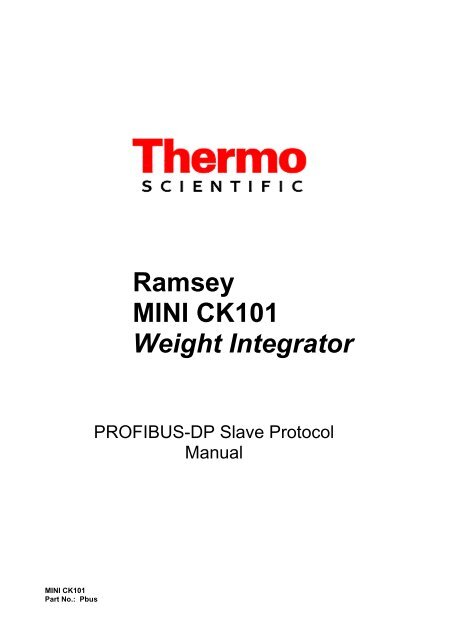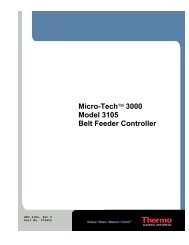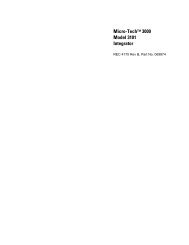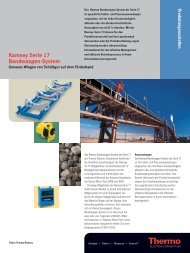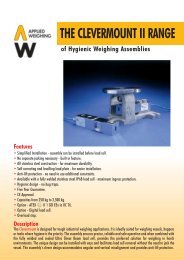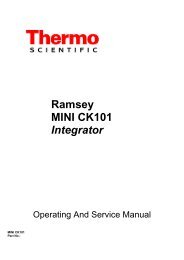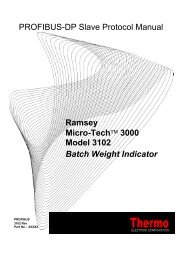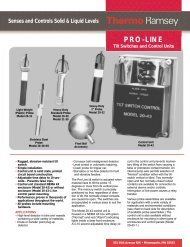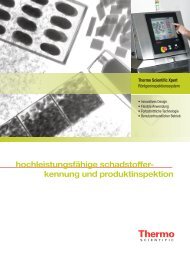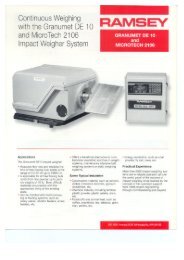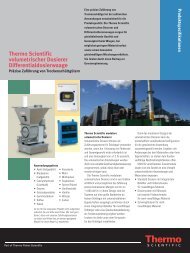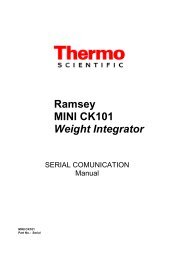Ramsey MINI CK101 Weight Integrator - Hoferick Engineering GmbH
Ramsey MINI CK101 Weight Integrator - Hoferick Engineering GmbH
Ramsey MINI CK101 Weight Integrator - Hoferick Engineering GmbH
You also want an ePaper? Increase the reach of your titles
YUMPU automatically turns print PDFs into web optimized ePapers that Google loves.
<strong>MINI</strong> <strong>CK101</strong><br />
Part No.: Pbus<br />
<strong>Ramsey</strong><br />
<strong>MINI</strong> <strong>CK101</strong><br />
<strong>Weight</strong> <strong>Integrator</strong><br />
PROFIBUS-DP Slave Protocol<br />
Manual
DOCUMENT HISTORY<br />
DATE<br />
April, 20098<br />
November,2008<br />
April,2009<br />
File: \\ 101_Pbus_X3<br />
REV<br />
X1<br />
X2<br />
X3<br />
Actual Software Release: 86.00.00.01<br />
Preliminary Issue<br />
REASON FOR CHANGE<br />
Updated for 86.00.00.00 release<br />
Updated for 86.00.00.01 release<br />
2 - 56<br />
AUTHOR<br />
Massimo Mazzoni<br />
Massimo Mazzoni<br />
Massimo Mazzoni
INDEX<br />
About this manual ................................................................................................................................. 3<br />
Bibliography ......................................................................................................................................... 4<br />
1. PROFIBUS OVERVIEW ................................................................................................................. 5<br />
1.1 Introduction to the PROFIBUS................................................................................................. 5<br />
1.2 The PROFIBUS-DP.................................................................................................................. 5<br />
1.3 Data Transfer ............................................................................................................................ 5<br />
1.4 Protection mechanisms ............................................................................................................. 5<br />
2 IMPLEMENTATION ON THE <strong>MINI</strong>CK 101................................................................................. 6<br />
2.1 The ‘PROFIBUS interface board’. ........................................................................................... 6<br />
2.2 <strong>MINI</strong>CK 101 configuration and test......................................................................................... 6<br />
2.3 Data transfer.............................................................................................................................. 8<br />
2.4 Timings ................................................................................................................................... 10<br />
2.5. Communication errors............................................................................................................. 11<br />
2.5.1. Diagnostics data .............................................................................................................. 11<br />
3 REGISTERS LIST.......................................................................................................................... 13<br />
3.1 Description of the variables .................................................................................................... 13<br />
3.2 Table 1: List of registers ......................................................................................................... 14<br />
3.3 Description of Registers......................................................................................................... 23<br />
3.3.1 Status............................................................................................................................... 24<br />
3.3.2 Dynamic Values.............................................................................................................. 30<br />
3.3.3 Display Data.................................................................................................................... 31<br />
3.3.4 Scale Data ....................................................................................................................... 34<br />
3.3.5 Calibration Data .............................................................................................................. 35<br />
3.3.6 Diagnostic data..................................................................................................................... 37<br />
3.3.7 I/O Data........................................................................................................................... 38<br />
3.3.8 Alarms.................................................................................................................................. 41<br />
3.3.9 Ethernet Settings ............................................................................................................. 42<br />
3.3.10 Profibus Settings ............................................................................................................. 43<br />
3.3.11 Load Out (Batch) ............................................................................................................ 44<br />
4.1 Read Operation Example ( Function 03 ) ............................................................................... 46<br />
4.2 Write Operation Example ....................................................................................................... 48<br />
APPENDIX A......................................................................................................................................... 50<br />
APPENDIX B ........................................................................................................................................ 53<br />
About this manual<br />
The PROFIBUS-DP Slave protocol manual consists of three parts.<br />
3 - 56
Chapter 1, is a brief overview of the PROFIBUS-DP protocol.<br />
Chapter 2, explains how PROFIBUS-DP protocol has been implemented in the <strong>Ramsey</strong> Mini CK instruments.<br />
The information contained in this section should be intent as general information, they are valid for<br />
all the <strong>MINI</strong> CK Series models.<br />
Chapter 3, is a detailed description of the data that can be transmitted and received to and from the instrument.<br />
This part is specific for the instrument model.<br />
Bibliography<br />
- PROFIBUS DIN 19245 Part 3 Order No. 0.012<br />
- SPC3 Siemens PROFIBUS Controller<br />
User description 10.04.96 Order No. 6ES7 195-0BD00-8BA0<br />
4 - 56
1. PROFIBUS OVERVIEW<br />
1.1 Introduction to the PROFIBUS<br />
The PROFIBUS born by the need to have an open, vendor independent communication system that allows<br />
to connect all the components used for the automation of technical processes.<br />
The PROFIBUS is a standardized communication system, all its characteristics, rules and technical<br />
information are collected in the PROFIBUS DIN 19245 normative.<br />
There are three main variation of PROFIBUS corresponding to the intended application: PROFIBUS-FMS ,<br />
PROFIBUS-DP and PROFIBUS-PA.<br />
1.2 The PROFIBUS-DP<br />
This is the performance optimized version of PROFIBUS, specially dedicated to time-critical<br />
communication between automation system and distributed peripherals.<br />
It is typically used to transfer I/O images between a main PLC and remote devices (normally sensors,<br />
actuators, transmitters). In this case it will be used to transfer (read and write) blocks of data also.<br />
PROFIBUS is a typical master/slave communication where the main PLC is the master and the remote<br />
devices are the slaves. It offers also the possibility to implement complex multi-master structures but this is<br />
not relevant for our purpose. The line is a 2 wires twinax cable, connection is EIA RS 485. Baud rate can<br />
be from 9,6 kbit/s up to 1,5 Mbit/s, length of the line is max 200 m at 1,5 Mbit/s extendible with repeaters.<br />
1.3 Data Transfer<br />
The interface between the Master and the Slave are structured in parameterization - configuration - and<br />
data transfer phase. In the parametrization and configuration phases each Slave compares its real<br />
configuration with the configuration data received from the Master. When verifying the configuration<br />
(device type, format and the length of information ...) has to be identical. This guarantees a protection<br />
against configuration fault. Only if these tests are successful the Slave can enter in the data exchange<br />
phase. Max number of data that it is possible to transfer at once in this phase is limited to 246 bytes (123<br />
words).<br />
1.4 Protection mechanisms<br />
Besides the configuration check to avoid erroneous configurations, the Slave uses the Watch Dog control<br />
to detect failures on the bus. If a Slave recognizes no successful data transfer with the Master within the<br />
Watch Dog control interval, it generates an alarm condition.<br />
5 - 56
2 IMPLEMENTATION ON THE <strong>MINI</strong>CK 101<br />
2.1 The ‘PROFIBUS interface board’.<br />
Connection to the PROFIBUS will be done through a dedicated optional board ‘PROFIBUS interface board’<br />
provided with the SPC3 controller. The SPC3 is an integrated circuit produced by SIEMENS, it handles the<br />
interface with the Master up to 12 Mbit/s.<br />
The PROFIBUS boards is provided by plug terminals 6 pin connector for RS485 connection. The board<br />
can be plugged into the instrument in the slot dedicated for the option. The software automatically will<br />
recognize it.<br />
2.2 <strong>MINI</strong>CK 101 configuration and test.<br />
The slave address and the buffer dimensions should be defined on the instrument setup: ‘MAIN MENU 5 -<br />
PROFIB scroll’.<br />
Define here the address of the instrument in the PROFIBUS net.<br />
────────────────────<br />
- PROFIB SCROLL 1 - Password: SERVICE<br />
Address<br />
1<br />
ENTER<br />
────────────────────<br />
Default: 1<br />
Min 1<br />
Max 126<br />
In the next two scroll the user can define independently the read and write buffer dimensions. This<br />
possibility is very useful since it allows to reduce the address space to allocate the instrument to the<br />
minimum needed.<br />
The dimension should be entered in number of words. This number includes also the header of the<br />
telegram (see Tab 2.1) that takes 4 words , so the minimum is 5 words.<br />
────────────────────<br />
- PROFIB SCROLL 2 - Password: SERVICE<br />
Read buffer dim<br />
48 words<br />
ENTER<br />
────────────────────<br />
Default: 48<br />
Min 5<br />
Max 48<br />
────────────────────<br />
6 - 56
────────────────────<br />
- PROFIB SCROLL 3 - Password: SERVICE<br />
Write buffer dim<br />
48 words<br />
ENTER<br />
────────────────────<br />
Default: 48<br />
Min 5<br />
Max 48<br />
────────────────────<br />
In the TEST SCROLL it is possible to check the actual status of the communication.<br />
────────────────────<br />
- TEST SCROLL 8 - Password: SERVICE<br />
Test communication B<br />
19.2 kb Wait Prm<br />
────────────────────<br />
In the third line the baud rate and status are dynamically displayed. The status can be:<br />
WAIT PRM it is waiting for the PARAMETER message<br />
WAIT CFG it is waiting for the CONFIGURATION message<br />
DATA EXC it is in the DATA EXCHANGE phase , configuration and parametrization have been<br />
completed successfully.<br />
The baud rate is automatically detected by the instrument, if the displayed value changes continuously it<br />
means that there are problems on the line or the CPU is OFF.<br />
7 - 56
2.3 Data transfer<br />
During the communication activity, the <strong>MINI</strong>CK 101 will always act as Slave, meaning that it will respond to a<br />
request from a Master device on the line, but will never attempt to send messages out.<br />
The PROFIBUS interface allows a remote intelligent device to read and write data from and to the instrument.<br />
Data is organized in registers, some of them are read only others write only groups.<br />
The master has the possibility to perform two type of operations: write data and read data. The first simply<br />
consists in sending to the <strong>MINI</strong> <strong>CK101</strong> the values to write in the registers together with indications to identify what<br />
registers have to be write. In the second case the procedure can be a little more complex since the reading<br />
operation can be proceeded by a write operation to tell to the <strong>MINI</strong> <strong>CK101</strong> what registers should be read. Write<br />
and read operation are explained in detail below.<br />
Write operations – Single register<br />
A typical structure of the telegram for the Writing single operation, is shown below<br />
elem.<br />
#<br />
1<br />
2<br />
3<br />
4<br />
5<br />
6<br />
7<br />
Tab.1<br />
Stamp<br />
register<br />
Slave Address<br />
Function<br />
Register Address HI<br />
Register Address LO<br />
Data HI<br />
Data LO<br />
type<br />
integer<br />
Integer<br />
Integer<br />
Integer<br />
Integer<br />
Integer<br />
Integer<br />
offset<br />
(bytes)<br />
8 - 56<br />
0<br />
1<br />
2<br />
3<br />
4<br />
5<br />
6<br />
note<br />
See below<br />
According to the Instrument<br />
Write 06 (Hex) – Single<br />
Register to write<br />
Register to write<br />
Data to write<br />
Data to write
Write operations – Multiple registers<br />
A typical structure of the telegram for the Writing multiple operation, is shown below<br />
elem.<br />
#<br />
1<br />
2<br />
3<br />
4<br />
5<br />
6<br />
7<br />
8<br />
9<br />
10<br />
11<br />
12<br />
Tab.2<br />
Stamp<br />
register<br />
Slave Address<br />
Function<br />
Register Address HI<br />
Register Address LO<br />
Nr.of register HI<br />
Nr.of register LO<br />
Bytes count<br />
Data HI<br />
Data LO<br />
Data HI<br />
Data LO<br />
STAMP: information for Use<br />
type<br />
integer<br />
Integer<br />
Integer<br />
Integer<br />
Integer<br />
Integer<br />
Integer<br />
Integer<br />
Integer<br />
Integer<br />
Integer<br />
Integer<br />
offset<br />
(bytes)<br />
9 - 56<br />
0<br />
1<br />
2<br />
3<br />
4<br />
5<br />
6<br />
7<br />
8<br />
9<br />
10<br />
11<br />
Note<br />
See below<br />
According to the Instrument<br />
Write 10 (Hex) – Multiple<br />
Start register<br />
Start register<br />
Numbers of registers to write ( words )<br />
Numbers of registers to write(words )<br />
Numbers of bytes to write<br />
Data to write<br />
Data to write<br />
Data to write<br />
Data to write
In the PROFIBUS protocol, data are transmitted continuously. So the same telegram is sent by the master<br />
to the slave more times. To avoid that the slave interprets continuously the same data (it would create<br />
problem also, for examples with the commands), the stamp is used. The slave interprets received data<br />
only if the stamp is different form the stamp received in the previous telegram. The master has only to<br />
change the stamp value when it create a new telegram. The stamp of the last interpreted telegram is retransmitted<br />
by the instrument in the read buffer.<br />
The ‘Data’ section contains the data to write in the order MSB - LSB.<br />
When the <strong>MINI</strong> CK 101 processes the ‘package’, before to write the received data in the registers, it checks that<br />
all the parameters are correct and the data to write do not overlaps specified max and min limit (each writeable<br />
register has own max and min limit, see table 3.1.).<br />
If it detects errors the write operation fails, a DIAGNOSTICS message will be activated.<br />
Read operations<br />
A typical structure of the telegram for the Reading operation, is shown below<br />
elem.<br />
#<br />
1<br />
2<br />
3<br />
4<br />
5<br />
6<br />
7<br />
Tab. 3<br />
Stamp<br />
register<br />
Slave Address<br />
Function<br />
Register Address HI<br />
Register Address LO<br />
Data HI<br />
Data LO<br />
type<br />
integer<br />
Single<br />
Single<br />
Single<br />
Single<br />
Integer<br />
integer<br />
offset<br />
(bytes)<br />
In the PROFIBUS protocol the master continuously reads data from slave.<br />
0<br />
1<br />
2<br />
3<br />
4<br />
5<br />
6<br />
10 - 56<br />
note<br />
See below<br />
According to the Instrument<br />
Read 03 (Hex)<br />
If the register is a “floating point” type the<br />
register is doubled<br />
If the register is a “floating point” type the<br />
register is doubled<br />
the <strong>MINI</strong> CK 101 will remember which registers have been required the last time and it will continue to update the<br />
read buffer with their actual values.<br />
What the Master will receive after a read operation is a buffer of data having the same structure of the write<br />
telegram (see paragraph above).<br />
2.4 Timings<br />
The instrument updates almost all its basic variables (e.g. weight, rate, totals ...) each 100 milliseconds. With the
same frequency the instrument updates the read buffer. If the master performs more communications in this<br />
period, it will receive more time the same data.<br />
The write request are interpreted by the instrument in polling with a period of 100 milliseconds.<br />
2.5. Communication errors<br />
The alarm condition ‘PROFIBUS comm. error’ is activated by the instrument in two conditions:<br />
o If the SPC3 controller installed on the ‘PROFIBUS interface board’ recognizes no successful data transfer<br />
within the watch dog control interval.<br />
o If the received data contains errors (value overlaps limits, register number does not exist, group number does<br />
not exist ... )<br />
The alarm can be defined as SHUT DOWN and the shut down digital output can be used to set the system in<br />
safety condition.<br />
In the second case the instrument also activates an EXPANDED DIAGNOSTIC request to the master.<br />
2.5.1. Diagnostics data<br />
The Master system has the possibility to detect a ‘communication error’ condition by checking the diagnostics. In<br />
case of error the MT2000 will activate the request for diagnostic acquisition indicating that expanded device<br />
related diagnostics data are present.<br />
When the master requires the diagnostics it will get:<br />
Byte<br />
0<br />
1<br />
2<br />
3<br />
4<br />
5<br />
6<br />
7<br />
7<br />
0<br />
0<br />
Tab. 4 - Composition of the diagnostics data<br />
6<br />
0<br />
0<br />
5<br />
0<br />
0<br />
Bit position<br />
GE Group Error Invalid group identifier, the group does not exist<br />
4<br />
0<br />
0<br />
3<br />
0<br />
GE<br />
11 - 56<br />
2<br />
0<br />
RE<br />
1<br />
1<br />
LE<br />
0<br />
0<br />
CE<br />
Diagnostics data<br />
StatStatus1<br />
StatStatus2<br />
StatStatus3<br />
MasterAdd<br />
IdentNumberHigh<br />
IdentNumberLow<br />
Ext Diag - Header<br />
Ext Diag - Data
RE Register number Error The number of requested registers is wrong<br />
LE Limits Error A write operation has been performed but the value to write overlaps the limits.<br />
CE Coherency Error The Master has tried to write or read partially a variable composed by more<br />
registers (e.g. only one word of a floating variable)<br />
Refer to DIN 19245 Part 3 for details about the meaning of the first 5 bytes.<br />
12 - 56
3 REGISTERS LIST<br />
3.1 Description of the variables<br />
The Table 1 of the next pages, lists the variables accessible by the Master specifically for the <strong>MINI</strong> CK 101<br />
<strong>Integrator</strong>.<br />
It is necessary at this point make a distinction between register and variables.<br />
A register is the basic unit of the data at which the Master can access. The groups are structured in registers,<br />
they are numbered and the identification number is used by the Master to identify the portion of a group to read or<br />
write. Their dimension is always one word.<br />
A variable is the format of storing of the data in the instrument memory. Its dimension can change depending by<br />
the variable type, we can have:<br />
INTEGER variable An integer is a variable of 1 word (1 register). It contains integer values in the<br />
ranges 0 to 65535 or +32767 to -32768. The integer variables can be structured<br />
in array of integers with various dimensions.<br />
FLOAT variable A float is a variable of two words (2 register). It contains REAL values in the<br />
single precision IEEE format (See Appendix A at the end of this document). The<br />
single precision format can represent values in the range 3.4*10 +38 to 1.18*10 -38<br />
LONG variable A float is a variable of two words (2 register). It contains REAL values in the<br />
NOTE<br />
A lot of real values are displayed on the instrument with a number of decimals that depends by the selected<br />
division. For what regards the communication, instrument always sends the value with all the decimals.<br />
For example:<br />
Net weight Displayed value: 10.2<br />
Sent value: 10.179982<br />
LEGEND:<br />
Register Conventional name<br />
Type Can be: RO The register can be read but can not be written. It will be inserted only in the<br />
read groups.<br />
RW The register can be read or written. It will be found either in the read or in the<br />
write groups.<br />
WO The register can only be written. It will be inserted only in the read groups.<br />
Low limit Minimum acceptable value for the variable. Lower values are considered as errors.<br />
High limit Maximum acceptable value for the variable. Higher values are considered as errors.<br />
Refresh t. Time between two updates of the variable in the instrument's memory.<br />
format Can be: char , integer, float or double<br />
Address (word) Number of word (decimal) in the mapping, at which the register can be found.<br />
Note Comments and/or special info on use.<br />
13 - 56
3.2 List of registers<br />
Simulation Key<br />
Write flag<br />
Display (1)<br />
Display (2)<br />
Display (3)<br />
Display (4)<br />
Display (5)<br />
Display (6)<br />
Display (7)<br />
Display (8)<br />
Display (9)<br />
Display (10)<br />
Display (11)<br />
Display (12)<br />
Display (13)<br />
Display (14)<br />
Display (15)<br />
Display (16)<br />
Display (17)<br />
Display (18)<br />
Display (19)<br />
Register Type<br />
WO<br />
RO<br />
RO<br />
RO<br />
RO<br />
RO<br />
RO<br />
RO<br />
RO<br />
RO<br />
RO<br />
RO<br />
RO<br />
RO<br />
RO<br />
RO<br />
RO<br />
RO<br />
RO<br />
RO<br />
RO<br />
(**)<br />
0<br />
-<br />
-<br />
-<br />
-<br />
-<br />
-<br />
-<br />
-<br />
-<br />
-<br />
-<br />
-<br />
-<br />
-<br />
-<br />
-<br />
-<br />
-<br />
-<br />
Low<br />
Limit<br />
(**)<br />
(*)<br />
-<br />
-<br />
-<br />
-<br />
-<br />
-<br />
-<br />
-<br />
-<br />
-<br />
-<br />
-<br />
-<br />
-<br />
-<br />
-<br />
-<br />
-<br />
-<br />
High<br />
Limit<br />
DISPLAY DATA<br />
14 - 56<br />
Refresh<br />
Time [ms]<br />
-<br />
-<br />
200<br />
200<br />
200<br />
200<br />
200<br />
200<br />
200<br />
200<br />
200<br />
200<br />
200<br />
200<br />
200<br />
200<br />
200<br />
200<br />
200<br />
200<br />
200<br />
Format<br />
Integer<br />
Integer<br />
Integer<br />
Integer<br />
Integer<br />
Integer<br />
Integer<br />
Integer<br />
Integer<br />
Integer<br />
Integer<br />
Integer<br />
Integer<br />
Integer<br />
Integer<br />
Integer<br />
Integer<br />
Integer<br />
Integer<br />
Integer<br />
Integer<br />
Address<br />
(word)<br />
(*) Max limit is the number of digital inputs, it depends by the hardware configuration of the instrument.<br />
(**) All the values are accepted but only a specific set of codes are interpreted as keys. See description<br />
of the variable.<br />
0<br />
1<br />
2<br />
3<br />
4<br />
5<br />
6<br />
7<br />
8<br />
9<br />
10<br />
11<br />
12<br />
13<br />
14<br />
15<br />
16<br />
17<br />
18<br />
19<br />
20<br />
Note
Register Type<br />
Display (20)<br />
Display (21)<br />
Display (22)<br />
Display (23)<br />
Display (24)<br />
Display (25)<br />
Display (26)<br />
Display (27)<br />
Display (28)<br />
Display (29)<br />
Display (30)<br />
Display (31)<br />
Display (32)<br />
Display (33)<br />
Display (34)<br />
Display (35)<br />
Display (36)<br />
Display (37)<br />
Display (38)<br />
Display (39)<br />
Display (40)<br />
Panel Leds<br />
Status (1)<br />
Status (2)<br />
Alarms (1)<br />
Alarms (2)<br />
RO<br />
RO<br />
RO<br />
RO<br />
RO<br />
RO<br />
RO<br />
RO<br />
RO<br />
RO<br />
RO<br />
RO<br />
RO<br />
RO<br />
RO<br />
RO<br />
RO<br />
RO<br />
RO<br />
RO<br />
RO<br />
RO<br />
RO<br />
RO<br />
RO<br />
RO<br />
-<br />
-<br />
-<br />
-<br />
-<br />
-<br />
-<br />
-<br />
-<br />
-<br />
-<br />
-<br />
-<br />
-<br />
-<br />
-<br />
-<br />
-<br />
-<br />
-<br />
-<br />
-<br />
-<br />
-<br />
-<br />
-<br />
Low<br />
Limit<br />
-<br />
-<br />
-<br />
-<br />
-<br />
-<br />
-<br />
-<br />
-<br />
-<br />
-<br />
-<br />
-<br />
-<br />
-<br />
-<br />
-<br />
-<br />
-<br />
-<br />
-<br />
High Limit<br />
15 - 56<br />
Refresh Time<br />
[ms]<br />
200<br />
200<br />
200<br />
200<br />
200<br />
200<br />
200<br />
200<br />
200<br />
200<br />
200<br />
200<br />
200<br />
200<br />
200<br />
200<br />
200<br />
200<br />
200<br />
200<br />
200<br />
STATUS AND DIAGNOSTIC DATA<br />
-<br />
-<br />
-<br />
-<br />
-<br />
200<br />
-<br />
-<br />
100<br />
100<br />
Format Address<br />
(word) Note<br />
Integer<br />
Integer<br />
Integer<br />
Integer<br />
Integer<br />
Integer<br />
Integer<br />
Integer<br />
Integer<br />
Integer<br />
Integer<br />
Integer<br />
Integer<br />
Integer<br />
Integer<br />
Integer<br />
Integer<br />
Integer<br />
Integer<br />
Integer<br />
Integer<br />
Integer<br />
Integer<br />
Integer<br />
Integer<br />
Integer<br />
21<br />
22<br />
23<br />
24<br />
25<br />
26<br />
27<br />
28<br />
29<br />
30<br />
31<br />
32<br />
33<br />
34<br />
35<br />
36<br />
37<br />
38<br />
39<br />
40<br />
41<br />
42<br />
43<br />
44<br />
45<br />
46
Alarms (3)<br />
Register Type<br />
In / Out image<br />
Commands<br />
Virtual Inputs Image<br />
Virtual Outputs<br />
Image<br />
Batch Counter<br />
Batch Set<br />
Belt Rate<br />
Belt Load<br />
Belt Speed<br />
Master Total<br />
Operator Total<br />
Reset Total<br />
Batch Total<br />
Master Total Double<br />
Operator Total<br />
Double<br />
Reset Total Double<br />
Batch Total Double<br />
Manual Zero<br />
Manual Span<br />
Units<br />
Total units<br />
Length units<br />
Rate units<br />
<strong>Weight</strong> units<br />
RO<br />
RO<br />
RW<br />
RW<br />
RO<br />
RO<br />
RW<br />
RO<br />
RO<br />
RO<br />
RO<br />
RW<br />
RW<br />
RO<br />
RO<br />
RW<br />
RW<br />
RW<br />
RW<br />
RW<br />
RW<br />
RW<br />
RW<br />
RW<br />
RW<br />
-<br />
-<br />
0<br />
0<br />
-<br />
-<br />
0<br />
-<br />
-<br />
-<br />
-<br />
0<br />
0<br />
-<br />
-<br />
0<br />
0<br />
0<br />
Low<br />
Limit<br />
-<br />
-<br />
0Xffff<br />
0xffff<br />
-<br />
-<br />
High Limit<br />
DYNAMIC DATA<br />
10000<br />
-<br />
-<br />
-<br />
-<br />
0<br />
0<br />
-<br />
-<br />
0<br />
0<br />
0<br />
0 120000<br />
500000 45000000<br />
Tab.7<br />
16 - 56<br />
Refresh Time<br />
[ms]<br />
100<br />
100<br />
100<br />
100<br />
100<br />
200<br />
200<br />
200<br />
100<br />
200<br />
100<br />
100<br />
100<br />
100<br />
100<br />
100<br />
100<br />
100<br />
DISPLAY DATA MENU<br />
Tab.7<br />
Tab.8 Tab.8<br />
Tab.9<br />
Tab.9<br />
Tab.10 Tab.10<br />
Tab.11 Tab.11<br />
-<br />
-<br />
-<br />
-<br />
-<br />
-<br />
-<br />
Format Address<br />
(word) Note<br />
Integer<br />
Integer<br />
Integer<br />
Integer<br />
Integer<br />
Integer<br />
Float<br />
Float<br />
Float<br />
Float<br />
float<br />
Float<br />
float<br />
float<br />
double<br />
double<br />
double<br />
double<br />
long<br />
float<br />
integer<br />
integer<br />
integer<br />
integer<br />
integer<br />
47<br />
48<br />
49<br />
50<br />
51<br />
54<br />
55<br />
57<br />
59<br />
61<br />
63<br />
65<br />
67<br />
69<br />
71<br />
75<br />
79<br />
83<br />
89<br />
91<br />
95<br />
96<br />
97<br />
98<br />
99
Language<br />
Register Type<br />
Time Format<br />
Date Format<br />
Line 3 Display<br />
Rate Damping<br />
Load Damping<br />
Speed Damping<br />
Scale Capacity<br />
Scale Division<br />
Scale Model<br />
Idler Space<br />
Angle<br />
Load Cell Capacity<br />
Load Cell Sensitivity<br />
Load Cell<br />
Resistance 1<br />
Load Cell<br />
Resistance 2<br />
Load Cell<br />
Resistance 3<br />
Load Cell<br />
Resistance 4<br />
Load Cell<br />
Resistance 5<br />
Load Cell<br />
Resistance 6<br />
Speed Input<br />
Dead Band<br />
Calibration Mode<br />
RW<br />
RW<br />
RW<br />
RW<br />
RW<br />
RW<br />
RW<br />
RW<br />
RW<br />
RW<br />
RW<br />
RW<br />
RW<br />
RW<br />
RW<br />
RW<br />
RW<br />
RW<br />
RW<br />
RW<br />
RW<br />
RW<br />
RW<br />
Low<br />
Limit<br />
High Limit<br />
Tab.12 Tab.12<br />
Tab.13 Tab.13<br />
Tab.14 Tab.14<br />
Tab.15 Tab.15<br />
0 400<br />
0 400<br />
0 400<br />
1<br />
Tab.16<br />
0<br />
Tab.17<br />
-25<br />
Tab.18<br />
0.5<br />
10<br />
SCALE DATA MENU<br />
200000<br />
-<br />
Tab.16<br />
10000<br />
Tab.17<br />
+25<br />
Tab.18<br />
3.5<br />
2000<br />
10 2000<br />
10 2000<br />
10 2000<br />
10 2000<br />
10 2000<br />
Tab.19 Tab.19<br />
0.0 5.0<br />
CALIBRATION DATA MENU<br />
Tab.20 Tab.20<br />
-<br />
17 - 56<br />
-<br />
-<br />
-<br />
-<br />
-<br />
-<br />
-<br />
-<br />
-<br />
-<br />
-<br />
-<br />
-<br />
-<br />
-<br />
-<br />
-<br />
-<br />
-<br />
-<br />
-<br />
Refresh Time<br />
[ms]<br />
Format Address<br />
(word) Note<br />
integer<br />
integer<br />
integer<br />
integer<br />
integer<br />
integer<br />
integer<br />
float<br />
integer<br />
integer<br />
float<br />
float<br />
float<br />
float<br />
float<br />
float<br />
float<br />
float<br />
float<br />
float<br />
integer<br />
float<br />
Integer<br />
100<br />
101<br />
102<br />
103<br />
104<br />
105<br />
106<br />
109<br />
111<br />
112<br />
113<br />
115<br />
117<br />
119<br />
121<br />
123<br />
125<br />
127<br />
129<br />
131<br />
133<br />
134<br />
138
Calibration<br />
Resistance<br />
Register Type<br />
Calibration Constant<br />
Chain <strong>Weight</strong><br />
Chain Constant<br />
Test <strong>Weight</strong><br />
<strong>Weight</strong> Constant<br />
Calibration Interval<br />
Rcal Factor<br />
Chain Factor<br />
<strong>Weight</strong> Factor<br />
Test Duration<br />
Length<br />
Test Durat. Leng.<br />
Full<br />
Test Durat. Leng.<br />
Part.<br />
Test Durat. Leng.<br />
Man.<br />
Test Duration revs.<br />
Test Duration Time<br />
Azt opt.<br />
Azt Range<br />
Azt Deviation<br />
Speed Capacity<br />
Calibration Number<br />
Protection Level<br />
AD Gross<br />
AD Net<br />
RW<br />
RO<br />
RW<br />
RO<br />
RW<br />
RO<br />
RW<br />
RW<br />
RW<br />
RW<br />
RW<br />
RW<br />
RW<br />
RW<br />
RW<br />
RW<br />
RW<br />
RW<br />
RW<br />
RW<br />
RW<br />
RO<br />
RO<br />
RO<br />
Low<br />
Limit<br />
High Limit<br />
10 1000000<br />
- -<br />
Tab.21 Tab.21<br />
- -<br />
Tab.22 Tab.22<br />
- -<br />
0 365<br />
-99.99 +99.99<br />
-99.99 +99.99<br />
-99.99 +99.99<br />
1 100000<br />
Tab.23 Tab.23<br />
Tab.24 Tab.24<br />
Tab.25 Tab.25<br />
1 100<br />
10 16200<br />
Tab.26 Tab.26<br />
0.0 10.0<br />
0.0 10.0<br />
Tab.27 Tab.27<br />
1 2<br />
-<br />
-<br />
-<br />
-<br />
DIAGNOSTIC MENU<br />
-<br />
-<br />
18 - 56<br />
-<br />
-<br />
-<br />
-<br />
-<br />
-<br />
-<br />
-<br />
-<br />
-<br />
-<br />
-<br />
-<br />
-<br />
-<br />
-<br />
-<br />
-<br />
-<br />
-<br />
-<br />
-<br />
-<br />
-<br />
Refresh Time<br />
[ms]<br />
Format Address<br />
(word) Note<br />
long<br />
float<br />
float<br />
float<br />
float<br />
float<br />
integer<br />
float<br />
float<br />
float<br />
float<br />
float<br />
float<br />
float<br />
integer<br />
integer<br />
Integer<br />
float<br />
float<br />
float<br />
Integer<br />
Integer<br />
long<br />
long<br />
139<br />
141<br />
143<br />
145<br />
147<br />
149<br />
151<br />
152<br />
154<br />
156<br />
158<br />
160<br />
162<br />
164<br />
166<br />
167<br />
168<br />
169<br />
171<br />
173<br />
175<br />
178<br />
179<br />
181
Register Type<br />
<strong>Weight</strong> Load Cell<br />
Zero Load Cell<br />
Span Load Cell<br />
Prescaler<br />
Test Duration Pulses<br />
Test Duration<br />
Length<br />
Service Password<br />
Operator Password<br />
Software version<br />
Analog Out<br />
Definition<br />
Analog Out Range<br />
Analog Out Delay<br />
Leng.<br />
Analog Out Delay<br />
Time<br />
Analog Out Filter<br />
Digital input 1 assign<br />
Digital input 2 assign<br />
Digital input 3 assign<br />
Digital input 4assign<br />
Digital input 5 assign<br />
Digital input 6 assign<br />
Digital input 7 assign<br />
Digital input 8 assign<br />
Digital input 9 assign<br />
Digital input 10<br />
assign<br />
Digital input 11<br />
assign<br />
RO<br />
RW<br />
RW<br />
RO<br />
RW<br />
RW<br />
RW<br />
RW<br />
RO<br />
RW<br />
RW<br />
RW<br />
RW<br />
RW<br />
RW<br />
RW<br />
RW<br />
RW<br />
RW<br />
RW<br />
RW<br />
RW<br />
RW<br />
RW<br />
RW<br />
-<br />
0<br />
0<br />
-<br />
1<br />
1<br />
Low<br />
Limit<br />
Tab.28<br />
Tab.29<br />
-<br />
Tab.30<br />
Tab.31<br />
Tab.32<br />
0<br />
0<br />
Tab.33<br />
Tab.33<br />
Tab.33<br />
Tab.33<br />
Tab.33<br />
Tab.33<br />
Tab.33<br />
Tab.33<br />
Tab.33<br />
Tab.33<br />
Tab.33<br />
-<br />
High Limit<br />
10000<br />
30000<br />
-<br />
1000000<br />
100000<br />
Tab.28<br />
Tab.29<br />
-<br />
I/O DATA MENU<br />
Tab.30<br />
-<br />
Tab.31<br />
Tab.32<br />
300<br />
400<br />
Tab.33<br />
Tab.33<br />
Tab.33<br />
Tab.33<br />
Tab.33<br />
Tab.33<br />
Tab.33<br />
Tab.33<br />
Tab.33<br />
Tab.33<br />
Tab.33<br />
19 - 56<br />
-<br />
-<br />
-<br />
-<br />
-<br />
-<br />
-<br />
-<br />
-<br />
-<br />
-<br />
-<br />
-<br />
Refresh Time<br />
[ms]<br />
100<br />
100<br />
100<br />
100<br />
100<br />
100<br />
100<br />
100<br />
100<br />
100<br />
100<br />
Format Address<br />
(word) Note<br />
float<br />
integer<br />
integer<br />
integer<br />
long<br />
float<br />
Integer<br />
integer<br />
integer<br />
integer<br />
integer<br />
float<br />
integer<br />
integer<br />
integer<br />
integer<br />
integer<br />
integer<br />
integer<br />
integer<br />
integer<br />
integer<br />
integer<br />
integer<br />
Integer<br />
183<br />
185<br />
186<br />
187<br />
188<br />
190<br />
192<br />
197<br />
202<br />
210<br />
211<br />
212<br />
214<br />
215<br />
216<br />
217<br />
218<br />
219<br />
220<br />
221<br />
222<br />
223<br />
224<br />
225<br />
226
Register Type<br />
Digital input 12<br />
assign<br />
Digital output 1<br />
assign<br />
Digital output 2<br />
assign<br />
Digital output 3<br />
assign<br />
Digital output 4<br />
assign<br />
Digital output 5<br />
assign<br />
Digital output 6<br />
assign<br />
Digital output 7<br />
assign<br />
Digital output 8<br />
assign<br />
Digital output 9<br />
assign<br />
Digital output 10<br />
assign<br />
Digital output 11<br />
assign<br />
Digital output 12<br />
assign<br />
Digital output 13<br />
assign<br />
Digital output 14<br />
assign<br />
Digital output 15<br />
assign<br />
Digital output 16<br />
assign<br />
Totalizer Out. Pulse<br />
Totalizer Out.<br />
Duration<br />
Clip Detection Mode<br />
Clip Detection<br />
Length<br />
Rate dev. Opt.<br />
RW<br />
RW<br />
RW<br />
RW<br />
RW<br />
RW<br />
RW<br />
RW<br />
RW<br />
RW<br />
RW<br />
RW<br />
RW<br />
RW<br />
RW<br />
RW<br />
RW<br />
RW<br />
RW<br />
RW<br />
RW<br />
RW<br />
Low<br />
Limit<br />
Tab.33<br />
Tab.34<br />
Tab.34<br />
Tab.34<br />
Tab.34<br />
Tab.34<br />
Tab.34<br />
Tab.34<br />
Tab.34<br />
Tab.34<br />
Tab.34<br />
Tab.34<br />
Tab.34<br />
Tab.34<br />
Tab.34<br />
Tab.34<br />
Tab.34<br />
0.001<br />
0.005<br />
Tab.35<br />
Tab.36<br />
Tab.37<br />
High Limit<br />
Tab.33<br />
Tab.34<br />
Tab.34<br />
Tab.34<br />
Tab.34<br />
Tab.34<br />
Tab.34<br />
Tab.34<br />
Tab.34<br />
Tab.34<br />
Tab.34<br />
Tab.34<br />
Tab.34<br />
Tab.34<br />
Tab.34<br />
Tab.34<br />
Tab.34<br />
100.0<br />
1.0<br />
Tab.35<br />
Tab.36<br />
20 - 56<br />
Refresh Time<br />
[ms]<br />
100<br />
100<br />
100<br />
100<br />
100<br />
100<br />
100<br />
100<br />
100<br />
100<br />
100<br />
100<br />
100<br />
100<br />
100<br />
100<br />
100<br />
100<br />
100<br />
100<br />
100<br />
ALARMS THRESHOLDS MENU<br />
Tab.37<br />
-<br />
Format Address<br />
(word) Note<br />
integer<br />
integer<br />
integer<br />
integer<br />
integer<br />
integer<br />
integer<br />
integer<br />
integer<br />
integer<br />
integer<br />
integer<br />
integer<br />
integer<br />
integer<br />
integer<br />
integer<br />
float<br />
float<br />
Integer<br />
float<br />
integer<br />
227<br />
228<br />
229<br />
230<br />
231<br />
232<br />
233<br />
234<br />
235<br />
236<br />
237<br />
238<br />
239<br />
240<br />
241<br />
242<br />
243<br />
244<br />
246<br />
248<br />
249<br />
253
Register Type<br />
Low rate delay<br />
Low rate set<br />
High rate delay<br />
High rate set<br />
Load dev. Opt.<br />
Low load delay<br />
Low load set<br />
High load delay<br />
High load set<br />
Speed dev. Opt.<br />
Low speed delay<br />
Low speed set<br />
High speed delay<br />
High speed set<br />
Alarm define 1<br />
Alarm define 2<br />
Alarm define 3<br />
Alarm define 4<br />
Alarm define 5<br />
Alarm define 6<br />
Alarm define 7<br />
Alarm define 8<br />
Alarm define 9<br />
Alarm define 10<br />
Alarm define 11<br />
Alarm define 12<br />
RW<br />
RW<br />
RW<br />
RW<br />
RW<br />
RW<br />
RW<br />
RW<br />
RW<br />
RW<br />
RW<br />
RW<br />
RW<br />
RW<br />
RW<br />
RW<br />
RW<br />
RW<br />
RW<br />
RW<br />
RW<br />
RW<br />
RW<br />
RW<br />
RW<br />
RW<br />
0<br />
0<br />
0<br />
0<br />
Low<br />
Limit<br />
Tab.38<br />
0<br />
0<br />
0<br />
0<br />
Tab.39<br />
0<br />
0<br />
0<br />
0<br />
Tab.40<br />
Tab.40<br />
Tab.40<br />
Tab.40<br />
Tab.40<br />
Tab.40<br />
Tab.40<br />
Tab.40<br />
Tab.40<br />
Tab.40<br />
Tab.40<br />
Tab.40<br />
90<br />
High Limit<br />
105 %<br />
90<br />
150 %<br />
Tab.38<br />
90<br />
105 %<br />
90<br />
200 %<br />
Tab.39<br />
90<br />
105 %<br />
90<br />
150 %<br />
ALARMS MENU<br />
Tab.40<br />
Tab.40<br />
Tab.40<br />
Tab.40<br />
Tab.40<br />
Tab.40<br />
Tab.40<br />
Tab.40<br />
Tab.40<br />
Tab.40<br />
Tab.40<br />
Tab.40<br />
21 - 56<br />
-<br />
-<br />
-<br />
-<br />
-<br />
-<br />
-<br />
-<br />
-<br />
-<br />
-<br />
-<br />
-<br />
-<br />
Refresh Time<br />
[ms]<br />
Format Address<br />
(word) Note<br />
integer<br />
float<br />
integer<br />
float<br />
integer<br />
integer<br />
float<br />
integer<br />
float<br />
integer<br />
integer<br />
float<br />
integer<br />
Float<br />
integer<br />
integer<br />
integer<br />
integer<br />
integer<br />
integer<br />
integer<br />
integer<br />
integer<br />
Integer<br />
integer<br />
integer<br />
254<br />
255<br />
257<br />
258<br />
260<br />
261<br />
262<br />
264<br />
265<br />
267<br />
268<br />
269<br />
271<br />
272<br />
276<br />
277<br />
278<br />
279<br />
280<br />
281<br />
282<br />
283<br />
284<br />
285<br />
286<br />
287
Register Type<br />
Alarm define 13<br />
Alarm define 14<br />
Alarm define 15<br />
Alarm define 16<br />
Alarm define 17<br />
Alarm define 18<br />
Alarm define 19<br />
Alarm define 20<br />
Alarm define 21<br />
Alarm define 22<br />
Alarm define 23<br />
Alarm define 24<br />
Alarm define 25<br />
Alarm define 26<br />
Alarm define 27<br />
Alarm define 28<br />
Alarm define 29<br />
Alarm define 30<br />
I.P. Address<br />
Net Mask Address<br />
Variables selection<br />
Swap integer data<br />
Swap float data<br />
Address<br />
Read Buffer Lenght<br />
Write Buffer Lenght<br />
RW<br />
RW<br />
RW<br />
RW<br />
RW<br />
RW<br />
RW<br />
RW<br />
RW<br />
RW<br />
RW<br />
RW<br />
RW<br />
RW<br />
RW<br />
RW<br />
RW<br />
RW<br />
RW<br />
RW<br />
RW<br />
RW<br />
RW<br />
RW<br />
RW<br />
Low<br />
Limit<br />
Tab.40<br />
Tab.40<br />
Tab.40<br />
Tab.40<br />
Tab.40<br />
Tab.40<br />
Tab.40<br />
Tab.40<br />
Tab.40<br />
Tab.40<br />
Tab.40<br />
Tab.40<br />
Tab.40<br />
Tab.40<br />
Tab.40<br />
Tab.40<br />
Tab.40<br />
Tab.40<br />
0.0.0.0<br />
0.0.0.0<br />
Tab.41<br />
Tab.42<br />
Tab.43<br />
1<br />
5<br />
High Limit<br />
Tab.40<br />
Tab.40<br />
Tab.40<br />
Tab.40<br />
Tab.40<br />
Tab.40<br />
Tab.40<br />
Tab.40<br />
Tab.40<br />
Tab.40<br />
Tab.40<br />
Tab.40<br />
Tab.40<br />
Tab.40<br />
Tab.40<br />
Tab.40<br />
Tab.40<br />
Tab.40<br />
NET MENU<br />
254.255.255.255<br />
-<br />
255.255.255.255<br />
Tab.41<br />
Tab.42<br />
Tab.43<br />
PROFIBUS MENU<br />
126<br />
-<br />
48<br />
48<br />
22 - 56<br />
-<br />
-<br />
-<br />
-<br />
-<br />
Refresh Time<br />
[ms]<br />
Format Address<br />
(word) Note<br />
integer<br />
integer<br />
integer<br />
integer<br />
integer<br />
integer<br />
integer<br />
integer<br />
integer<br />
integer<br />
integer<br />
integer<br />
integer<br />
integer<br />
integer<br />
integer<br />
integer<br />
integer<br />
integer<br />
integer<br />
integer<br />
integer<br />
integer<br />
integer<br />
integer<br />
288<br />
289<br />
290<br />
291<br />
292<br />
293<br />
294<br />
295<br />
296<br />
297<br />
298<br />
299<br />
300<br />
301<br />
302<br />
303<br />
304<br />
305<br />
308<br />
316<br />
324<br />
325<br />
326<br />
339<br />
340
Register Type<br />
Low<br />
Limit<br />
High Limit<br />
Refresh Time<br />
[ms]<br />
Format Address<br />
(word) Note<br />
RW 5 - integer 341<br />
Batch Option<br />
Preset<br />
CutOff Corr<br />
CutOff queue<br />
CutOff Len<br />
CutOddDev<br />
Start Delay<br />
Stabilization Time<br />
Batch Deviation<br />
Tab. 5 – Variables list<br />
RW<br />
RW<br />
RW<br />
RW<br />
RW<br />
RW<br />
RW<br />
RW<br />
RW<br />
Tab.44<br />
0<br />
Tab.45<br />
0<br />
Tab.46<br />
3.3 Description of Registers<br />
0<br />
0<br />
0<br />
0<br />
LOAD OUT MENU<br />
Tab.44<br />
10000<br />
Tab.45<br />
10000<br />
Tab.46<br />
10000<br />
600<br />
600<br />
100<br />
Below the description of the register and their use.<br />
23 - 56<br />
-<br />
-<br />
-<br />
-<br />
-<br />
-<br />
-<br />
-<br />
-<br />
integer<br />
float<br />
integer<br />
float<br />
float<br />
float<br />
integer<br />
integer<br />
integer<br />
Sim_Key The master has the possibility to send a key code to the instrument. Interpreted key<br />
codes are:<br />
Key<br />
UP ARROW<br />
DOWN ARROW<br />
RUN<br />
Tab 6 - key codes<br />
Key Code<br />
0048 H<br />
0050 H<br />
0052 H<br />
Write Flag Set to 0 after a message has been received and properly processed. If a message is<br />
correctly received but cannot be processed because password protection or size<br />
error, this flag is set to 1. The user may read this register after a write message to<br />
ensure the data have been accepted.<br />
Key<br />
F1<br />
F2<br />
F3<br />
357<br />
358<br />
360<br />
361<br />
363<br />
365<br />
367<br />
368<br />
369<br />
Key Code<br />
003F H<br />
0040 H<br />
0041 H
Display Contains the messages actually shown on the display of the instrument in form of an<br />
ASCII string. For example the following screen:<br />
3.3.1 Status<br />
- MENU MAIN 1 -<br />
PRESS MENU FOR MORE<br />
ZERO SPAN MAT’L<br />
CAL CAL CAL<br />
Will be stored in registers in the following way:<br />
Display(1) 2DH 20H Characters 1 and 2 from left of first row<br />
Display(2) 4DH 45H<br />
Display(3) 4EH 55H<br />
Display(4) 20H 4DH<br />
Display(5) 41H 49H<br />
Display(6) 4EH 20H<br />
…..<br />
Display(10) …. …. Characters 19 and 20 from left of first row<br />
Display (11) …. …. Characters 1 and 2 from left second row<br />
…..<br />
Display(20) …. …. Characters 19 and 20 from left of second row<br />
Display(21) …. …. Characters 1 and 2 from left of third row<br />
…..<br />
Display(30) …. …. Characters 19 and 20 from left of third row<br />
Display(31) …. …. Characters 1 and 2 from left of fourth row<br />
…..<br />
Display(38) 4CH 20H<br />
Display(39) 20H 20H<br />
Display(40) 20H 20H Characters 19 and 20 from left of fourth row<br />
Panel Leds The word below indicates the status of the 5 leds on the front panel of the instrument.<br />
Panel Led<br />
NU<br />
NU<br />
NU<br />
NU<br />
PL1.04 Run Led<br />
PL1.03 Span Led<br />
PL1.02 Zero Led<br />
PL1.01 Ready Led<br />
PL1.00 Alarm Led<br />
NU<br />
Status The actual status of the instrument is resumed in two words, each bit has an own<br />
NU<br />
24 - 56<br />
NU<br />
NU<br />
NU<br />
NU<br />
NU<br />
04<br />
03<br />
02<br />
01<br />
00
meanings, when the bit is 1 the associated status is true.<br />
Status 1 - Generals<br />
15<br />
14<br />
13<br />
NU<br />
NU<br />
S1.15 Cumulative shut down S1.07 High load<br />
S1.14 Cumulative Alarms S1.06 Low load<br />
S1.13 Calibration running S1.05 High rate<br />
S1.12 Free S1.04 Low rate<br />
S1.11 Free S1.03 High speed<br />
S1.10 Running S1.02 Low speed<br />
S1.09 Free S1.01 Free<br />
S1.08 Ready S1.00 Free<br />
10<br />
25 - 56<br />
NU<br />
Status 2 - Control deviations & Batch<br />
NU<br />
NU<br />
NU<br />
NU<br />
NU<br />
NU<br />
NU<br />
Only applicable if Load Out option installed :<br />
S2.03 S2.02 S2.01 S2.00<br />
x 0 0 0 Batch not running<br />
x 0 0 1 Not used<br />
x 0 1 0 Batch running at high rate<br />
x 0 1 1 Batch running at low rate<br />
x 1 0 0 Waiting start delay time<br />
x 1 0 1 Waiting stabilization time<br />
1 x x x Batch suspended<br />
08<br />
NU<br />
07<br />
NU<br />
S2.15 Free S2.07 Free<br />
S2.14 Free S2.06 Free<br />
S2.13 Free S2.05 Free<br />
S2.12 Free S2.04 Free<br />
S2.11 Free<br />
S2.10 Free<br />
S2.09 Free<br />
S2.08 Free<br />
06<br />
NU<br />
05<br />
NU<br />
04<br />
NU<br />
03<br />
03<br />
x can be : 0 Normal status<br />
1 Stand by status<br />
Alarms In the alarms register, each bit represents the status of an alarm. If the alarm is active,<br />
the relevant bit will contain '1', otherwise it will contain '0'.<br />
Alarms 1<br />
NU<br />
14<br />
NU<br />
NU<br />
11<br />
10<br />
A1.15 Free A1.07 LOW RATE<br />
A1.14 CELL FAIL A1.06 HIGH SPEED<br />
09<br />
08<br />
07<br />
06<br />
05<br />
04<br />
03<br />
02<br />
02<br />
02<br />
NU<br />
01<br />
01<br />
NU<br />
00<br />
00
A1.13 Free A1.05 LOW SPEED<br />
A1.12 Free A1.04 WARM START<br />
A1.11 SPEED SENSOR ERROR A1.03 COLD START<br />
A1.10 HIGH LOAD A1.02 PWD DURING CALIB<br />
A1.09 LOW LOAD A1.01 CAL TIME ELAPSED<br />
A1.08 HIGH RATE A1.00 EXTERNAL ALARM<br />
Alarms 2<br />
NU<br />
NU<br />
13<br />
12<br />
11<br />
NU<br />
26 - 56<br />
NU<br />
NU<br />
NU<br />
A2.15 Free A2.07 Free<br />
A2.14 Free A2.06 Free<br />
A2.13 OVERFLOW TOTALIZER A2.05 Free<br />
A2.12 AZT OVER LIMIT A2.04 Free<br />
A2.11 BATCH DEVIATION A2.03 Free<br />
A2.10 Free A2.02 Free<br />
A2.09 Free A2.01 Free<br />
A2.08 Free<br />
Alarms 3<br />
15<br />
NU<br />
NU<br />
NU<br />
NU<br />
NU<br />
A3.15 PROFIB COMM ERROR A3.07 Free<br />
A3.14 Free A3.06 Free<br />
A3.13 Free A3.05 Free<br />
A3.12 Free A3.04 Free<br />
A3.11 Free A3.03 Free<br />
A3.10 Free A3.02 Free<br />
A3.09 Free A3.01 Free<br />
A3.08 Free A3.00 Free<br />
I/O Image The instrument has physical inputs and outputs to which logical input and output<br />
functions are associated. As far as communication is concerned, only the status of<br />
physical inputs and outputs are transferred.<br />
NU<br />
Input Image – Inputs installed on board<br />
NU<br />
NU<br />
NU<br />
NU<br />
NU<br />
NU<br />
I1.01 in 2 - mother board<br />
I1.00 in 1 - mother board<br />
NU<br />
NU<br />
NU<br />
Output Image – Outputs installed on board<br />
NU<br />
NU<br />
NU<br />
NU<br />
NU<br />
NU<br />
NU<br />
O1.04 output 5 - mother board<br />
O1.03 output 4 - mother board<br />
O1.02 output 3 - mother board<br />
O1.01 output 2 - mother board<br />
NU<br />
NU<br />
NU<br />
NU<br />
NU<br />
NU<br />
NU<br />
NU<br />
NU<br />
NU<br />
NU<br />
NU<br />
NU<br />
NU<br />
NU<br />
04<br />
NU<br />
NU<br />
NU<br />
03<br />
NU<br />
NU<br />
NU<br />
02<br />
NU<br />
NU<br />
01<br />
01<br />
NU<br />
NU<br />
00<br />
00
O1.00 output 1 - mother board<br />
Commands Each bit of the commands register is specified as follows. In order to give a command,<br />
the Host must set the relevant bit to 1 and write (send) the register to the instrument.<br />
The action will be performed if the write message is accepted.<br />
Commands<br />
15<br />
NU<br />
NU<br />
NU<br />
NU<br />
10<br />
27 - 56<br />
09<br />
08<br />
C1.15 SAVE SETUP DATA C1.07 REMOTE SPAN CALIBR. (CHAIN )<br />
C1.14 NOT USED C1.06 REMOTE SPAN CALIBR. (WTS)<br />
C1.13 NOT USED C1.05 REMOTE START ZERO<br />
C1.12 NOT USED C1.04 CONFIRM ZERO / SPAN<br />
C1.11 NOT USED C1.03 STANDBY BATCH<br />
C1.10 CLEAR OPER. TOTAL C1.02 STOP BATCH<br />
C1.09 CLEAR RESET TOTAL C1.01 START BATCH<br />
C1.08 REMOTE SPAN CALIBR. ( RCAL) C1.00 RESET ALARM<br />
Calibration commands:<br />
It is possible to start a calibration function from remote. At the end of the calibration ( calibration flag in<br />
status registers should be tested to determines when cal function ends ) it is possible to verify the<br />
calibration error ( ‘cal_error’ register ) and eventually accept the new zero or span.<br />
Autospan RCAL Start the autospan function with RCAL method. The Rcal is automatically<br />
connected by the instrument at the begin of the function and disconnected at its<br />
end. This operation needs a delay of 0.5 seconds. In case a RCAL remote<br />
calibration is aborted , the calibration flags will turn off after this delay.<br />
Autospan WTS Start the autospan function with WTS method. An output of the MiniCK can be<br />
programmed to automatically load the test weights, this adds a 10 seconds delay<br />
at the begin and at the end of the calibration function. In case a WTS remote<br />
calibration is aborted , the calibration flags will turn off after this time.<br />
Autozero Start the autozero function.<br />
Confirm zero/span ( C1.04) at the end of the calibration function tells to the instrument to save the new<br />
zero or span. If this command is sent during a remote calibration it aborts the running function.<br />
Batch commands:<br />
The batch can be controlled by PROFIBUS :<br />
Stop Batch Temporarily stops a Load Out (batch) sequence. Batch can resume if a Start command<br />
is sent later.<br />
Abort Batch Definitively interrupt a Load Out (batch) sequence.<br />
Start Batch Starts a Load Out (batch) sequence.<br />
07<br />
06<br />
05<br />
04<br />
03<br />
02<br />
01<br />
00
Reset Commands<br />
When the instrument receives a ‘Clear Reset total’ or a ‘Reset alarm’ command, it executes the command<br />
for all the scales.<br />
Clear Operator total Clear the operator total register.<br />
Clear Reset total Clear the reset total register.<br />
Reset Alarms Reset any pending alarm<br />
In order to give a command, the Host must set the relevant bit to 1 and write (send) the register to the instrument.<br />
The action will be performed if the write message is accepted.<br />
Virtual I/O Image To allow an easy management when the <strong>MINI</strong> CK 101 is connected to a network, is<br />
possible to perform the I/O exchange only at level software, without using the available<br />
hardware I/O . Two words are dedicated for this function one for the Inputs and one for<br />
the outputs according the mapping and description below.<br />
Virtual Input Image<br />
NU<br />
NU<br />
NU<br />
NU<br />
11<br />
10<br />
VI1.15 Free VI1.07 Start batch<br />
VI1.14 Free VI1.06 Clip detect<br />
VI1.13 Free VI1.05 Auto zero<br />
VI1.12 Free VI1.04 Reset alarms<br />
VI1.11 Calib. 2 VI1.03 Reset totals<br />
VI1.10 Calib. 1 VI1.02 Belt running<br />
VI1.09 Stand-by batch VI1.01 Free<br />
VI1.08 Stoop batch VI1.00 Ext. Input<br />
Virtual Output Image<br />
15<br />
14<br />
NU<br />
12<br />
11<br />
10<br />
28 - 56<br />
09<br />
09<br />
VO1.16 Cumul. Rate Deviation VO1.07 High Speed<br />
VO1.14 Cumul. Deviation Alarm VO1.06 Low Rate<br />
VO1.15 Load Test weight VO1.05 High Rate<br />
VO1.13 Free VO1.04 Low Load<br />
VO1.12 Batch High Rate VO1.03 High Load<br />
VO1.11 Batch Low Rate VO1.02 Ready<br />
VO1.10 Totalizer VO1.01 Cumulative Shut down<br />
VO1.08 Low Speed VO1.00 Cumulative Alarm<br />
08<br />
08<br />
07<br />
07<br />
06<br />
06<br />
05<br />
05<br />
04<br />
04<br />
03<br />
03<br />
02<br />
02<br />
NU<br />
01<br />
00<br />
00
29 - 56
3.3.2 Dynamic Values<br />
Batch Counter The number of the currently running load out or the number of the last finished one. The<br />
integrator automatically increments the batch number when a new batch is started.<br />
Batch_Set The set point for the current or the next load out. Usually entered or downloaded by the<br />
user. For reading operations, the Batch_set value is updated only when a batch is<br />
started.<br />
Rate The instantaneous rate in engineering units as currently displayed on the RUN screen.<br />
Belt Load The instantaneous linear weight in engineering units.<br />
Belt Load The instantaneous belt speed in engineering units.<br />
Master Total The current value of the master Totalizer of the integrator.<br />
Operator Total The current value of the operator Totalizer of the integrator.<br />
Operator total can be zeroed by writing zero to this register.<br />
Reset Total The current value of the reset Totalizer of the integrator.<br />
Reset total can be zeroed by writing zero to this register.<br />
Batch Total The current contents of the load out totalizer. Usually read at end of batch to check the<br />
result of the load out. This register is automatically cleared when a new batch is started<br />
Master Total The current value of the master Totalizer of the integrator, in double format<br />
Operator Total The current value of the Operator Totalizer of the integrator, in double format<br />
Reset Total The current value of the Reset Totalizer of the integrator, in double format<br />
Batch Total The current value of the Batch Totalizer of the integrator, in double format<br />
Manual Zero The value in engineering units of the “Zero” constant of the scale.<br />
Manual Span The value in engineering units of the “Span” constant of the scale.<br />
30 - 56
3.3.3 Display Data<br />
Units Code of the “Measure Units” displayed according the table below:<br />
SETTINGs CODE<br />
METRIC 00H<br />
ENGLISH 01H<br />
MIXED 02H<br />
Tab 7 – Units codes<br />
Total Units Code of the “Totalization Units” displayed according the table below:<br />
SETTINGs CODE<br />
KG 00H<br />
TONNES 01H<br />
POUNDS 02H<br />
TONS 03H<br />
LTONS<br />
Tab 8 – Total units code<br />
04H<br />
Length Units Code of the “Lenght Units” displayed according the table below:<br />
SETTINGs CODE<br />
METERS 00H<br />
FEET<br />
Tab 9 – Length unit codes<br />
01H<br />
Rate Units Code of the “Rate Units” displayed according the table below:<br />
SETTINGs CODE<br />
PERCENT % 00H<br />
KG/H 01H<br />
t/H 02H<br />
LB/H 03H<br />
TPH 04H<br />
LTPH 05H<br />
KG/MN 06H<br />
t/MN 07H<br />
LB/MN 08H<br />
T/MN 09H<br />
LT/MN 0AH<br />
Tab 10 – Rate units codes<br />
31 - 56
<strong>Weight</strong> Units Code of the “LoadCells Units” displayed according the table below:<br />
SETTINGs CODE<br />
KG 00H<br />
POUNDS 02H<br />
Tab 11 – <strong>Weight</strong> units codes<br />
Language Code of the setted “Language” according the table below<br />
SETTINGs CODE<br />
USA 00H<br />
SPANISH 01H<br />
ITALIAN 02H<br />
FRENCH 03H<br />
GERMAN 04H<br />
DUTCH 05H<br />
Tab 12 – Language code<br />
Time Format Code of the setted “Time Format” according the table below:<br />
SETTINGs CODE<br />
12H 00H<br />
24H 01H<br />
Tab 13 – Time format codes<br />
Date Format Code of the setted “Date Format” according the table below:<br />
SETTINGs CODE<br />
GG-MM-YYYY 00H<br />
MM-GG-YYY 01H<br />
Tab 14 – Date format codes<br />
Line 3 Display Code of the setted “Line 3 Display” according the table below:<br />
SETTINGs CODE<br />
SPEED 00H<br />
LOAD 01H<br />
Not Used 02H<br />
NO DISPLAY 03H<br />
Tab 15 – Line 3 display codes<br />
Rate Damping The Value in seconds of the displayed “Rate Damping”.<br />
Load Damping The Value in seconds of the displayed “Load Damping”.<br />
32 - 56
Speed Damping The Value in seconds of the displayed “Speed Damping”<br />
33 - 56
3.3.4 Scale Data<br />
Scale Capacity The maximum rate of the integrator, entered by the user in the instrument setup. It is<br />
the reference value for the high and low rate set expressed in per cent.<br />
Scale Division Code of the Scale decimal places (Division) actually setted, according the table below:<br />
SETTINGs CODE<br />
50 00H<br />
20 01H<br />
10 02H<br />
5 03H<br />
2 04H<br />
1 05H<br />
0,5 06H<br />
0,2 07H<br />
0,1 08H<br />
0,05 09H<br />
0,02 0AH<br />
0,01 0BH<br />
0,005 0CH<br />
0,002 0DH<br />
0,001 0EH<br />
Tab 16- scale division codes<br />
Scale model The code number of <strong>Ramsey</strong> Scale used for internal calibration calculation.<br />
Idler Space The value in engineering units of the distance between the idlers across the scale.<br />
The min and maximun limits for this one are :<br />
UNITS Feet Meters<br />
LANGUAGE ITA OTHER<br />
MAX 120 25000 2500<br />
MIN 2 50 50<br />
Tab 17- Idler space limits<br />
Angle The value in engineering units of the Angle of Inclination of the Scale.<br />
Load Cell Capacity The value in engineering units of the Capacity of the load cell, as it appear on the label.<br />
UNITS Pounds Kg<br />
MAX 15000 5000<br />
MIN 1 1<br />
Tab 18- Load cell capacity limits<br />
34 - 56
Load Cell Sensitivity The value in mV/V of the load cell Sensitivity.<br />
Load Cell Resistance 1 The value in engineering units of the Input Resistance of the load cell N° 1<br />
Load Cell Resistance 2 The value in engineering units of the Input Resistance of the load cell N° 2<br />
Load Cell Resistance 3 The value in engineering units of the Input Resistance of the load cell N° 3<br />
Load Cell Resistance 4 The value in engineering units of the Input Resistance of the load cell N° 4.<br />
Load Cell Resistance 5 The value in engineering units of the Input Resistance of the load cell N° 5<br />
Load Cell Resistance 6 The value in engineering units of the Input Resistance of the load cell N° 6<br />
Speed Input Code of the “Speed Sensor Input” selected according the table below:<br />
SETTINGs CODE<br />
SINGLE 00H<br />
SIMULATED 01H<br />
Tab 19 – speed input code<br />
Dead Band The value in percentage of the scale capacity (rate) in which the rate is ignored.<br />
3.3.5 Calibration Data<br />
Calibration Mode Code of the “Calibration mode” selected according the table below:<br />
SETTINGs CODE<br />
R-CAL 00H<br />
TEST CHAIN 01H<br />
TEST WEIGHT 02H<br />
Tab 20 – calibration code<br />
Calibration Resistance The value of the resistor used for the “Calibration with Resistance”.<br />
Calibration Constant The value of the constant for the resistance calculated by instrument.<br />
Chain <strong>Weight</strong> The value in engineering units of the chain used as a sample weight for<br />
calibration.<br />
UNITS English Metric<br />
MAX 1000 3000<br />
MIN 0 0<br />
Tab 21- Chain weight limits<br />
Chain Constant The value of the constant for the chain calculated by instrument.<br />
Test <strong>Weight</strong> The value in engineering units of the sample weight used for calibration :<br />
35 - 56
UNITS English Metric<br />
MAX LC CAP * LC NUMBER LC CAP * LC NUMBER<br />
MIN 0 0<br />
Tab 22- Test weight limits<br />
<strong>Weight</strong> Constant The value of the constant for the sample weight calculated by instrument.<br />
Calibration Interval Number of selected days between two calibration.<br />
RCal Factor Number in percentage used to correct the “Calibration Constant” value to the real<br />
value.<br />
Chain Factor Number in percentage used to correct the “Chain Constant” value to the real<br />
value.<br />
<strong>Weight</strong> Factor Number in percentage used to correct the “<strong>Weight</strong> Constant” value to the real<br />
value.<br />
Test Duration Length The value in engineering units of one complete belt revolution.<br />
Test Durat. Length Full The value in engineering unit of the measured length of “one belt revolution” :<br />
UNITS Feet Meters<br />
MAX 10000 3000<br />
MIN 1 0.5<br />
Tab 23- Test duration length full limits<br />
Test Durat. Length Partial The value in engineering unit of the measured partial length of “belt”.<br />
UNITS Feet Meters<br />
MAX 10000 3000<br />
MIN 1 0.5<br />
Tab 24- Test duration length partial limits<br />
Test Durat. Length Manual The value in engineering unit of the measured length of “one belt revolution” :<br />
UNITS Feet Meters<br />
MAX 10000 3000<br />
MIN 1 0.5<br />
Tab 25- Test duration length manual limits<br />
36 - 56
Test Duration The value in engineering units of the last performed calibration.<br />
Test Duration Time The value in second of the last performed calibration.<br />
Azt opt. The enable option for AZT function.<br />
SETTINGs CODE<br />
NO 00H<br />
YES 01H<br />
Tab 26 – Azt option limits<br />
Azt Range The value in percentage of the Range of action of AutoZero tracking with<br />
reference to the scale capacity.<br />
Azt Deviation The value in engineering units of the Maximum amount of zero error, that the<br />
AutoZero tracking can automatically compensate.<br />
Speed Capacity The value in engineering units of the maximum speed capacity of the system.<br />
UNITS Feet Meters<br />
MAX 2000 10<br />
MIN 1 0.1<br />
Tab 27- Speed capacity limits<br />
Calibration Number The value of Number of calibration defined<br />
Protection Level Protection level of the instrument when password is enetred.<br />
3.3.6 Diagnostic data<br />
AD Gross Instantaneous value in engineering units of the AD counter converter (Gross).<br />
AD Net Instantaneous value in engineering units of the AD counter converter (Net Only).<br />
<strong>Weight</strong> Load Cell Instantaneous Value in mV of the load cell.<br />
Zero Load Cell Value in engineering units of the AD converter equivalent to the Zero Calibration.<br />
Span Load Cell Value in engineering units of the AD converter equivalent to the Span Calibration.<br />
Prescaler Reduction factor for speed sensor count.<br />
Test Duration Pulses N° of counted pulses during the material calibration.<br />
Test Duration Length Length in meter equivalent to one or more belt revolution used for material calibration.<br />
Service Password Numeric digit or a letter of the alphabet used by service people.The maximum length is<br />
10 ascii characters:<br />
37 - 56
VALID RANGE<br />
a – z<br />
A – Z<br />
0 - 9<br />
Tab 28- Service password limit<br />
Operator Password Numeric digit or a letter of the alphabet used by operator people. The maximum length<br />
is 10 ascii characters:<br />
VALID RANGE<br />
a – z<br />
A – Z<br />
0 - 9<br />
Tab 29- Operator password limit<br />
Software version Release of the Instrument firmware’s.<br />
3.3.7 I/O Data<br />
Analog Out Definition Code of the setted “Out function” according the table below:<br />
SETTINGs CODE<br />
NONE 00H<br />
RATE 01H<br />
SPEED 02H<br />
LOAD 03H<br />
Tab 30 – analog out define code<br />
Analog Out Range Code of the setted “Range” according the table below:<br />
SETTINGs CODE<br />
0-20 mA 00H<br />
4-20 mA 01H<br />
20-0 mA 02H<br />
20-4 mA 03H<br />
Tab 31 – analog out range code<br />
Analog Out Delay Length The value in meter of the delay of the Analog Output.<br />
38 - 56
UNITS Feet Meters<br />
MAX 10000 300<br />
MIN 0 0<br />
Tab 32- Analog out delay length limits<br />
Analog Out delay Time The value in second of the delay of the Analog Output.<br />
Analog Out Filter The value in second that the output takes for the stabilization after a status<br />
variation.<br />
Digital inputs assign The digital inputs configuration.<br />
INPUT ASSIGN<br />
NUMBERS<br />
MAX 2<br />
MIN 0<br />
Tab 33- Digital input assign numbers limits<br />
Digital outputs assign The digital oputputs configuration.<br />
OUTPUT ASSIGN<br />
NUMBERS<br />
MAX 5<br />
MIN 0<br />
Tab 34- Digital output assign numbers limits<br />
Totalizer Output Pulse Frequency value (divisor) relevant the weight for which the output is activate.<br />
Totalizer Output Durat. The value in seconds of the duration of the pulse of the totalizer output’s<br />
Clip Detection Mode Code of the setted “Clip Detection Mode” according the table below:<br />
SETTINGs CODE<br />
MANUAL 00H<br />
AUTO 01H<br />
Tab 35 – Clip detect range code<br />
Clip Detection Length The value in meter, of the belt length, for which the calculation of Rate, must be<br />
kept freezed.<br />
39 - 56
UNITS Feet Meters<br />
MAX 10 3<br />
MIN 0.5 0.1<br />
Tab 36- Clip detect length limits<br />
40 - 56
3.3.8 Alarms<br />
Rate deviation opt. Enable the rate alarm condition.<br />
SETTINGs CODE<br />
NO 00H<br />
YES 01H<br />
Tab 37 – Rate dev. option limits<br />
Low rate delay Delay time for low rate alarm condition.<br />
Low rate set Set value for low rate alarm condition.<br />
High rate delay Delay time for high rate alarm condition.<br />
High rate set Set value for high rate alarm condition.<br />
Load deviation opt. Enable the load alarm condition.<br />
SETTINGs CODE<br />
NO 00H<br />
YES 01H<br />
Tab 38– Load dev. option limits<br />
Low load delay Delay time for low load alarm condition.<br />
Low load set Set value for low load alarm condition.<br />
High load delay Delay time for high load alarm condition.<br />
High load set Set value for high load alarm condition.<br />
Speed deviation opt. Enable the speed alarm condition.<br />
SETTINGs CODE<br />
NO 00H<br />
YES 01H<br />
Tab 39 – Speed dev. option limits<br />
Low speed delay Delay time for low speed alarm condition.<br />
Low speed set Set value for low speed alarm condition.<br />
High speed delay Delay time for high speed alarm condition.<br />
High speed set Set value for high speed alarm condition.<br />
Alarm defines The user can select the desired mode between ALARM (just a warning<br />
message), SHUT DOWN (Warning message) and NONE (no action).<br />
41 - 56
3.3.9 Ethernet Settings<br />
Code of the setted “Alarm define mode” according the table below:<br />
SETTINGs CODE<br />
AD_NONE 00H<br />
AD_ALARM 01H<br />
AD_SHUTDOWN 02H<br />
Tab 40 – Alarm define code<br />
I.P. Address Represent the value of the I.P address of the device ( default : 169.254.1.3).<br />
SubNet Mask Represent the value of the Subnet Mask configured on the device (default :<br />
255.255.255.000).<br />
Variable Selection Code of mode on how the variable are transmitted according the table below:<br />
SETTINGs WORD<br />
NO DUMPED 00H<br />
DUMPED 01H<br />
DISPLAYED 02H<br />
Tab 41– Variable selection range code<br />
Swap integer data Mode to swap integer data in the communication protocols :<br />
SETTINGs WORD<br />
S_COM_SWAP_NONE 00H<br />
S_COM_SWAP_BYTES 01H<br />
S_COM_SWAP_WORD 02H<br />
S_COM_SWAP_BYTES_WORD 03H<br />
Tab 42– Variable selection range code<br />
Swap float data Mode to swap float data in the communication protocols :<br />
SETTINGs WORD<br />
S_COM_SWAP_NONE 00H<br />
S_COM_SWAP_BYTES 01H<br />
S_COM_SWAP_WORD 02H<br />
S_COM_SWAP_BYTES_WORD 03H<br />
Tab 43– Variable selection range code<br />
42 - 56
3.3.10 Profibus Settings<br />
Address Address of the device in the Profibus network.<br />
Read Buffer Length Size in N° of word the Reading Buffer.<br />
Write Buffer Length Size in N° of word the Writing Buffer.<br />
43 - 56
3.3.11 Load Out (Batch)<br />
Batch Option Enable the load out function.<br />
SETTINGs CODE<br />
NO 00H<br />
YES 01H<br />
Tab 44 – Batch option limits<br />
Batch Preset The pre-set point for the current or the next load out. Defines when the rate will be<br />
lowered to increase batch accuracy.<br />
CutOff Corr. The CutOff correction is the amount of material which flows on the belt scale after the<br />
batch end has been turned off. Select the method you want to use :<br />
SETTINGs WORD<br />
S_COFFNONE 00H<br />
S_COFFADJ 01H<br />
S_COFFAUTO 02H<br />
Tab 45 – CutOff correction code<br />
CutOff queue If the selection of the CutOff Corr is S_COFFNONE, the user can directly enter the<br />
CutOff queue.<br />
CutOff len If the selection of the CutOff Corr is S_COFFAUTO , the user can enter the length of<br />
belt travel between the scale and the feeding point:<br />
UNITS Feet Meters<br />
MAX 300 100<br />
MIN 0 0<br />
Tab 46- CutOff len limits<br />
CutOff dev If the selection of the CutOff Corr is S_ S_COFFADJ, the user must enter the<br />
maximum correction that the system is allowed to perform to the cut-off value.<br />
.<br />
Start Delay After the start command has been given, the system will wait the start delay entered<br />
here before activating the batch command.<br />
Stabilization time After the batch command has been turned off at end of batch, the system will wait the<br />
coasting time entered here before freezing the batch total and print the batch data.<br />
Batch deviation At end of batch, the system checks the error. If error is larger than the batch deviation<br />
ntered here, an alarm is generated.<br />
44 - 56
45 - 56
4 QUERY, RESPONSE MESSAGES AND EXAMPLE<br />
Below there are the structure of the data query from a Master (PLC) to the Salve (<strong>MINI</strong> CK 101)<br />
Starting from the slave address field, the structure is that of the MODBUS message, exept for error check field.<br />
4.1 Read Operation Example ( Function 03 )<br />
QUERY RESPONSE MESSAGE<br />
Stamp xxx Stamp xxx<br />
Slave Address xxx Slave Address xxx<br />
Function 03H Function 03H<br />
Address. HI xxx Byte Count xxx<br />
Address. LO xxx Data MSB xxx<br />
N° Data HI xxx ... xxx<br />
N° Data LO xxx Data LSB xxx<br />
EXAMPLE 1 – READ HOLDING REGISTER<br />
The Host wants to receive the Linear <strong>Weight</strong> (belt Load) :<br />
Address of slave : 01<br />
Register N°: 59 (3B Hex)<br />
Type of register: Float<br />
Load value: 100,0 Kg/m<br />
HOST (PLC) SLAVE (<strong>MINI</strong> CK)<br />
Stamp 3AH<br />
Slave Address 01H<br />
Function 03H<br />
Address HI 00H<br />
Address LO 3BH<br />
N° Data HI 00H<br />
N° data LO 02H <br />
3AH Stamp<br />
01H Slave Address<br />
03H Function<br />
04H Byte Count<br />
42H Data Hi<br />
C8H Data Lo<br />
00H Data Hi<br />
00H Data Lo<br />
46 - 56
EXAMPLE 2 – READ HOLDING REGISTER<br />
The Host wants to receive the Scale Division Settings :<br />
Address of slave : 01<br />
Register N°: 111 (6F Hex)<br />
Type of register: integer<br />
Division: 0,05<br />
HOST (PLC) SLAVE (<strong>MINI</strong> CK)<br />
Stamp 3AH <br />
Slave Address 01H<br />
Function 03H<br />
Address HI 00H<br />
Address LO 6FH<br />
N° Data HI 00H<br />
N° data LO 01H <br />
3AH Stamp<br />
01H Slave Address<br />
03H Function<br />
02H Byte Count<br />
00H Data MSB<br />
09H Data LSB<br />
47 - 56
4.2 Write Operation Example<br />
SINGLE REGISTER(1 Word)<br />
QUERY RESPONSE MESSAGE<br />
Stamp xxx Stamp xxx<br />
Slave Address xxx Slave Address xxx<br />
Function 06H Function 06H<br />
Address. HI xxx Address. HI xxx<br />
Address. LO xxx Address. LO xxx<br />
Preset Data HI xxx Preset Data HI xxx<br />
Preset Data LO xxx Preset Data LO xxx<br />
EXAMPLE 1<br />
The Host wants to select (write) the language of the Instrument :<br />
Address of slave : 01<br />
Register N°: 100 (64 Hex)<br />
Type of register: integer<br />
Settings: French (03Hex)<br />
HOST (PLC) SLAVE (<strong>MINI</strong> CK)<br />
Stamp 3AH <br />
Slave Address 01H<br />
Function 06H<br />
Address HI 00H<br />
Address LO 64H<br />
Preset Data HI 00H<br />
Preset Data LO 03H <br />
3AH Stamp<br />
01H Slave Address<br />
06H Function<br />
00H Address HI<br />
64H Address LO<br />
00H Preset Data HI<br />
03H Preset Data LO<br />
48 - 56
MULTIPLE REGISTERS<br />
QUERY RESPONSE MESSAGE<br />
Stamp xxx Stamp xxx<br />
Slave Address xxx Slave Address xxx<br />
Function 10H Function 10H<br />
Start Address. HI xxx Start Address. HI xxx<br />
Start Address. LO xxx Start Address. LO xxx<br />
N° of Registers HI xxx N° of Registers HI xxx<br />
N° of Registers LO xxx N° of Registers LO xxx<br />
Byte Count xxx<br />
Data Hi xxx<br />
Data Lo xxx<br />
Data Hi xxx<br />
Data Lo xxx<br />
EXAMPLE 1<br />
The Host wants to write the scale capacity of the Instrument :<br />
Address of slave : 01<br />
Register N°: 109 (6D Hex)<br />
Type of register: float<br />
Settings: 100.0 Kg<br />
HOST (PLC) SLAVE (<strong>MINI</strong> CK)<br />
Stamp 3AH <br />
Slave Address 01H<br />
Function 10H<br />
Start Address. HI 00H<br />
Start Address. LO 06D<br />
N° of Registers HI 00H<br />
N° of Registers LO 02H<br />
Byte Count 04H<br />
Data Hi 00H<br />
Data Lo 00H<br />
Data Hi 42H<br />
Data Lo C8H <br />
3AH Stamp<br />
01H Slave Address<br />
10H Function<br />
00H Start Address HI<br />
6DH Start Address LO<br />
00H N° Data HI<br />
02H N° Data LO<br />
49 - 56
APPENDIX A<br />
FLOATING POINT NOTATION<br />
<strong>MINI</strong> CK 101 stores floating point data types using the IEEE single precision format. The format contains a sign<br />
bit, an exponent field and a fraction field or mantissa.<br />
• The represented value<br />
the value of the number being represented is equal to the exponent multiplied by the fractional part with the<br />
sign specified by the bit sign field:<br />
• Sign Bit<br />
(-1) sign * (1.0+fraction) * s (exp-bias)<br />
For detailed information, refer to the ANSI IEEE Standard for Binary Floating Point Arithmetic.<br />
The sign of the number being represented is stored in the sign bit. If the number is positive, the sign bit<br />
contains the value 0. If it is negative, it contains the value 1. The sign bit is stored in the most significant bit<br />
of a floating point value.<br />
• Exponent Field<br />
Using an exponent increases the range of representable numbers. The exponent field of the number<br />
contains a ‘biased’ form of the exponent. A bias is subtracted from the exponent field, letting the actual<br />
exponent represent both positive and negative exponents. The value of this bias is hexadecimal 7F<br />
therefore the effective exponent (Rexp) of the number can be obtained as:<br />
Note<br />
Rexp = Exp - 7F<br />
If both the exponent field and the fraction field are equal to zero, the number being represented is zero.<br />
• Fraction field (Mantissa)<br />
IEEE floating point format stores the fractional part of a number in a “normalized” form. It assumes that all<br />
nonzero numbers are of the following form:<br />
1.xxxxxxxx (binary)<br />
The character x represent either 0 or 1 (binary).<br />
Since all floating point numbers being with 1, the 1 becomes the implicit normalized bit. It is the most<br />
significant bit of the fraction and is not stored in memory. The binary point is located immediately to the<br />
right of the normalized bit. All bits after the binary point represent values less the 1 (binary).<br />
Example:<br />
The number 1.625 (dec) can be represented as:<br />
50 - 56
1.101 (bin)<br />
This number can be represented in decimal as:<br />
• Examples<br />
2 0 + 2 -1 + 2 -3 (dec) Or 1 + 0.5 + 0.25<br />
some example has been added to help in the understanding of the rules explained above.<br />
Ex 1.<br />
The number 100.0 is represented as : 42 c8 00 00 (hex) or:<br />
0 1 0 0 0 0 1 0 1 1 0 0 1 0 0 0 0 0 0 0 0 0 0 0 0 0 0 0 0 0 0 0<br />
— — — — — — — — — — — — — — — — — — — — — — — — — — — — — — — —<br />
Bit 31 30 23 22 16 0<br />
The sign is positive (bit 31 is 0).<br />
The Exponent Field is : 1 0 0 0 0 1 0 1 (bin), 85 (hex). The exp is : exp = 85(hex) - bias (7F hex) = 6.<br />
Thus the first implicit bit to 1 has weight 6<br />
At this point the mantissa can be represented in this way, with the weight of each bit.<br />
2 6 2 5 2 4 2 3 2 2 2 1 2 0 2 -1 2 -2 2 -3 .............<br />
1 1 0 0 1 0 0 0 0 0 0 ............ 0<br />
— — — — — — — — — — — ............ —<br />
Bi t Imp 22 0<br />
Now it is enough to sum the weight of the bits at 1.<br />
Value = 2 6 (imp) + 2 5 + 2 2 = 100.0<br />
Ex 2.<br />
Value = 0.15, binary representation is:<br />
0 0 1 1 1 1 1 0 0 0 0 1 1 0 0 1 1 0 0 1 1 0 0 1 1 0 0 1 1 0 1 0—<br />
— — — — — — — — — — — — — — — — — — — — — — — — — — — — — — —<br />
Bit 31 30 23 22 0<br />
Sign = 0 positive<br />
Exp = 7C hex - 7F hex = -3<br />
Mantissa =<br />
2 -3 2 -4 2 -5 2 -6 2 -7 2 -8 2 -9 2 -10 .............<br />
1 0 0 1 1 0 0 1 1 0 0 1 1 0 0 1 1 0 0 1 1 0 1 0<br />
— — — — — — — — — — — — — — — — — — — — — — — —<br />
Bit Imp 22 0<br />
51 - 56
Value = 2 -3 + 2 -6 + 2 -7 + 2 -10 + 2 -11 ...... = 0.15 (approx.)<br />
Ex 3.<br />
Value = -5.5, binary representation is:<br />
1 1 0 0 0 0 0 0 1 0 1 1 0 0 0 0 0 0 0 0 0 0 0 0 0 0 0 0 0 0 0 0<br />
— — — — — — — — — — — — — — — — — — — — — — — — — — — — — — — —<br />
Bit 31 30 23 22 0<br />
Sign = 1 negative<br />
Exp = 81hex - 7F hex = +2<br />
Mantissa =<br />
2 2 2 1 2 0 2 -1 2 -2 2 -3 2 -4 2 -5 2 -6 2 -7 2 -8 2 -9 2 -10 .............<br />
1 0 1 1 0 0 0 0 0 0 0 0 0 0 0 0 0 0 0 0 0 0 0 0<br />
— — — — — — — — — — — — — — — — — — — — — — — —<br />
Bit Imp 22 0<br />
Value = 2 2 (imp.) + 2 0 + 2 -1 = 5.5 (negative)<br />
52 - 56
APPENDIX B<br />
INSTRUMENT CONFIGURATION: THE “GSD” FILE<br />
Profibus devices have different performances characteristics. Features differ in regards to available functionality<br />
or possible bus parameters such as baud rate and time monitoring. These parameters vary individually for each<br />
device type and vendor. For this reason the PROFIBUS Organization has standardized a database file, it<br />
contains all the characteristics of the PROFIBUS device and must be delivered by the vendor together with the<br />
device. This file has a name that depends by the vendor and an extension that is normally GSD but can be<br />
different depending by the country of origin of the device. The third letter of the extension in fact defines the<br />
country:<br />
D - Default, is valid for each country<br />
I - Italian<br />
G - German<br />
E - English<br />
F - French<br />
P - Portuguese<br />
S - Spanish<br />
Refers to the manual of the device you are using as Master of your PROFIBUS network to get information about<br />
how to use the GSD file.<br />
These are the main PROFIBUS characteristics of the <strong>Ramsey</strong> <strong>MINI</strong> CK 101 instruments.<br />
Vendor <strong>Ramsey</strong><br />
Model <strong>MINI</strong><strong>CK101</strong><br />
Ident number 0x2101<br />
Protocol Standard DP<br />
Baud rate supported from 9.6 kb to 12 Mb<br />
Freeze Mode supp NO<br />
Sync Mode supp NO<br />
Auto Baud supp YES<br />
Set Slave Add_supp NO<br />
Station Type Compact<br />
Prm Data Length 7<br />
Diag Data Length 8<br />
Config Data Length 9<br />
Input data length (write buffer) 5-48 word, coherency over word<br />
Output data length (read buffer) 5-48 word, coherency over word<br />
53 - 56
To change I/O data length<br />
The instrument gives the possibility to define the write and read buffer dimensions. Default values are 48 words<br />
for both, if the user changes them he should also modify the GSD file so that the configuration in the instrument<br />
setup and in the file corresponds.<br />
To make it is easy. The GSD file should be edited with a normal text editor and the value at the directive ‘module<br />
=’ at the bottom of the file should be changed. It normally appears as follows:<br />
Module = "<strong>MINI</strong><strong>CK101</strong>" 0xC0,0x6F,0x6F<br />
The first value (0xC0) should be left unchanged, the second value specifies the dimension of the write buffer, the<br />
third of the read buffer.<br />
The value to set should be computed as follows:<br />
where:<br />
Read_Buffer_Dim = 63 + RBD<br />
Write_Buffer_Dim = 63 + WBD<br />
RBD is the read buffer dimension defined in the instrument setup.<br />
WBD is the write buffer dimension defined in the instrument setup.<br />
The value should be then converted and written in hexadecimal notation.<br />
The meaning of the default values 0x6F is:<br />
6F hex = 111 dec = 63 + 48<br />
48 is the default dimension of the buffers.<br />
Instruction are also contained in the GSD file.<br />
54 - 56
Follows the contents of the <strong>Ramsey</strong> <strong>MINI</strong><strong>CK101</strong> GSD file.<br />
R_<strong>MINI</strong><strong>CK101</strong>.GSD :<br />
#Profibus_DP<br />
GSD_Revision = 1<br />
;<br />
Vendor_Name = "<strong>Ramsey</strong>"<br />
Model_Name = "<strong>MINI</strong><strong>CK101</strong><br />
Revision = "Rev.A”<br />
Ident_Number = 0x2105<br />
Protocol_Ident = 0<br />
Station_Type = 0<br />
FMS_supp = 0<br />
Hardware_Release = "Rev.A"<br />
Software_Release = "86.GSD.01"<br />
;<br />
9.6_supp = 1<br />
19.2_supp = 1<br />
93.75_supp = 1<br />
187.5_supp = 1<br />
500_supp = 1<br />
1.5M_supp = 1<br />
3M_supp = 1<br />
6M_supp = 1<br />
12M_supp = 1<br />
;<br />
MaxTsdr_9.6 = 60<br />
MaxTsdr_19.2 = 60<br />
MaxTsdr_93.75 = 60<br />
MaxTsdr_187.5 = 60<br />
MaxTsdr_500 = 100<br />
MaxTsdr_1.5M = 150<br />
MaxTsdr_3M = 250<br />
MaxTsdr_6M = 450<br />
MaxTsdr_12M = 800<br />
;<br />
Redundancy = 0<br />
Repeater_Ctrl_Sig = 0<br />
24V_Pins = 0<br />
Implementation_Type = "ifak"<br />
Bitmap_Device = "dev.dib"<br />
Bitmap_Diag = "diag.dib"<br />
Bitmap_SF = "sf.dib"<br />
;<br />
Freeze_Mode_supp = 0<br />
Sync_Mode_supp = 0<br />
Auto_Baud_supp = 1<br />
Set_Slave_Add_supp = 0<br />
Min_Slave_Intervall = 12<br />
;<br />
55 - 56
Modular_Station = 0<br />
Modul_Offset = 1<br />
Max_User_Prm_Data_Len= 7<br />
;<br />
Fail_Safe = 0<br />
Slave_Family = 5<br />
Max_Diag_Data_Len = 8<br />
;<br />
Unit_Diag_Bit(0) = "Coherency Error"<br />
Unit_Diag_Bit(1) = "Limits Error"<br />
Unit_Diag_Bit(2) = "Register Number Error"<br />
Unit_Diag_Bit(3) = "Group ID Error"<br />
;<br />
;------------------------------------------------------<br />
;<br />
; Buffers dimension<br />
;<br />
; Standard buffer dimension is : 48 words read buffer (0x6F)<br />
; 48 words write buffer (0x6F)<br />
;<br />
; Dimensions can be changed by modifing the last two value in the<br />
; 'Module' definition below.<br />
; The value should be obtained as follows:<br />
;<br />
; 63 + WB_WN or 63 + RB_WN<br />
;<br />
; where WB_WN is the wished words number for the write buffer, RB_WN is<br />
; the wished words number for the read buffer.;<br />
: The value should be converted in hexadecimal format. Default value<br />
; hex 6F corresponds to:<br />
;<br />
; 63 + 48 -> 111 dec -> 6F hex<br />
;<br />
; WB_WN and RB_WN values must be entered also in the instrument setup<br />
; in decimal format.<br />
;<br />
; Write buffer ----+ +---- Read buffer<br />
; | |<br />
; V V<br />
;<br />
Module = "MT2000" 0xC0,0x6F,0x6F<br />
1<br />
EndModule<br />
;<br />
56 - 56


